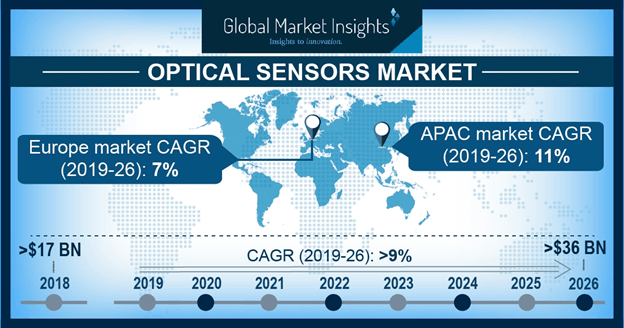Fiber optical sensor market to chart out a profitable growth map over 2016-2024, surging requirement across the medical sector to stimulate the product demand
Publisher : Fractovia | Published Date : 2017-04-24Request Sample
Boasting of a perennial contribution toward the evolution of the smart era, optical sensor market has today established its immutable vestiges across various geographies. Optical sensor find numerous applications across the industrial, automotive, aerospace & defense, healthcare, and consumer electronics sectors. The utilization scope and high demand of these products for occupancy sensing, perimeter security, gesture recognition, and presence detection in smart appliances and surveillance systems will be a major catalyst for optical sensor industry.
Key companies operating in optical sensor market have, of late, shifted their focus toward strategic partnerships from secluded core competency, primarily to establish a stronger presence across the value chain. Owing to stiff competition, companies engage in mergers & acquisitions to manufacture products that boast of optimal performance, superior efficiency, and high quality. For instance, the year 2015 witnessed Avago Technologies, headquartered in San Jose, California, partner with Broadcom Incorporation to expand their product portfolio and accumulate a major share of semiconductors industry. Major biggies competing in optical sensor market include Baumer Group, STMicroelectronics, Sony, Finisar, Canon, Omron, Sick AG, Samsung, Eaton, Omnivision, ABB, Broadcom Inc., Robert Bosch, Coherent, Analog Devices, and Emcore. Pertaining to the extensive activities these companies are involved in, especially regarding novel product developments, optical sensor industry is likely to be valued at USD 30 billion by 2014, with a CAGR estimation 7.5% over 2016-2024.
China Optical Sensor Market size, by application, 2013-2024 (USD Million)

Asia Pacific has a significant contribution toward global optical sensor market revenue. Back in 2015, APAC accounted for more than 30% of the overall share, with prime contributors being India, China, and South Korea. Surging demand in the region for consumer electronic portable devices such as cameras and smartphones is likely to propel Asia Pacific optical sensor market, projected to be worth more than USD 10 billion by 2024.
The U.S. has always been on the progressive growth map with regards to the smart industry and automation. Increased demand for factory automation coupled with escalating demand for optical devices in smart appliances will fuel U.S. optical sensor market over 2016-2024.
Optical sensor find extensive applications in smart industry. These devices are integrated with surveillance systems to ensure movement detection, intrusion monitoring, and presence identification for smart homes. Ingrained with features such as UV detection, personnel distance, ambient background lighting, and LED color detection that help enhance heating and lighting systems, these devices also contribute toward optimum energy consumption. Additionally, these sensors are subject to periodic technical upgrades that are utilized in authentic mobile payment systems and for fingerprint recognition in security systems, providing a positive impetus to optimal sensors market over 2016-2024.
Fiber optic sensors, position sensors, image sensors, and ambient light sensors are the four prime product segmentations of optical sensor industry. Owing to the remarkable benefits of fiber optic devices, such as electromagnetic immunity and flexibility and the high demand wearable electronics, fiber optical sensor market will observe a lucrative growth over the next few years. The integration of this technology in belts, garments, and other textiles for monitoring the flow of blood, cardiac output, blood pressure, and heart rate will also positively influence fiber optical sensor industry.
The surging demand for these devices across the healthcare sector will indeed propel global optical sensor market. Rising integration of fiber optic sensors with medical imaging devices helps detect vital signs in critical patients and monitor blood flow to assess the requirement for blood sampling in critically ill toddlers and adults. Increasing implementation of these devices by medical care providers to provide a categorical diagnosis and corresponding treatment will drive optical sensor market from healthcare applications. Escalating usage of these devices in healthcare platforms such as SPHERE, that help detect cardiovascular disorders, stroke, obesity, and depression will also push optical sensor industry from the healthcare sector, which accounted for more than 12% of the total share in 2015.
Image sensors are widely used across the personal and consumer electronics sector, owing to which image optical sensor market will grow at a CAGR of more than 7.3% over 2016-2024. High demand for these sensors in 3D mapping, restore recognition, and eye tracking will also fuel image optical sensor industry, which accounted for more than 50% of the overall share in 2015.
Rising demand for smartphones, cameras, and other portable devices will augment optical sensor market from consumer electronics, especially across developing economies such as China and India.
Ambient light sensors optimize the viewing perspective of the display with the help of an embedded backlight, that helps enhance user experience and saves power, thereby stimulating ambient light optical sensor market, set to grow at a CAGR of 7.9% over 2016-2024. Owing to their supreme features such as low power consumption, simple output algorithms, and low light sensitivity, they are increasingly integrated in electronic appliances such as mobile phones and tablets, thus propelling ambient light optical sensor industry, valued at USD 1.75 billion in 2015.
The superior detection and presence identification capabilities of optical sensor have led to their widespread usage across the aerospace & defense sectors. High demand for these devices for security and surveillance systems will drive optical sensor market from aerospace & defense applications, set to grow at a CAGR of more than 8.2% over 2016-2024.
Global optical sensor industry is characterized by fierce competition. Key vendors are collaborating with one another to expand their product offering. Joint ventures by major OEMs and rising investments to supply high quality solutions are typical growth strategies observed in this market. Escalating demand for these devices across myriad application sectors will prompt companies to come up with innovative solutions and technologically advanced products, thereby stimulating optical sensor industry.